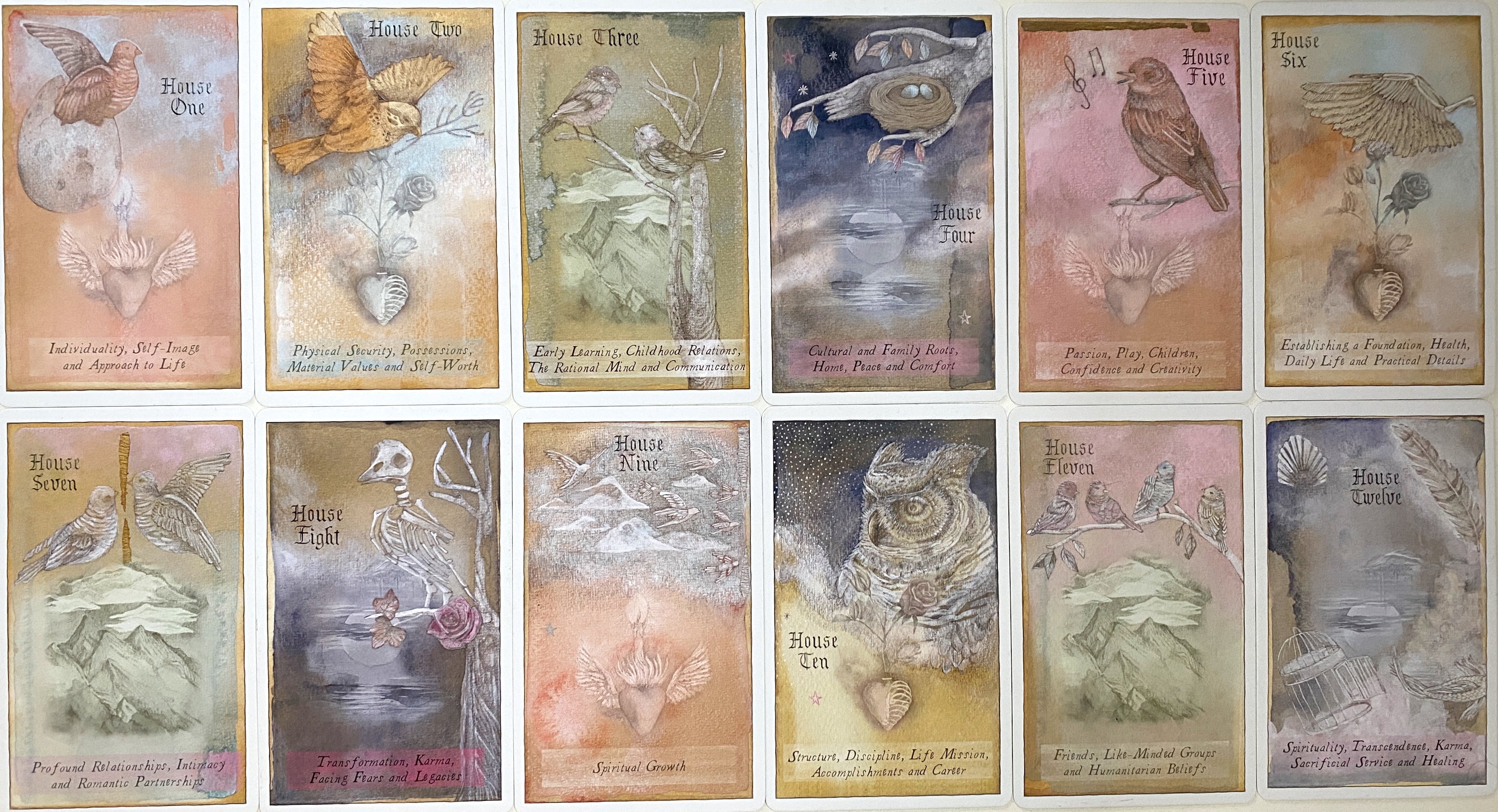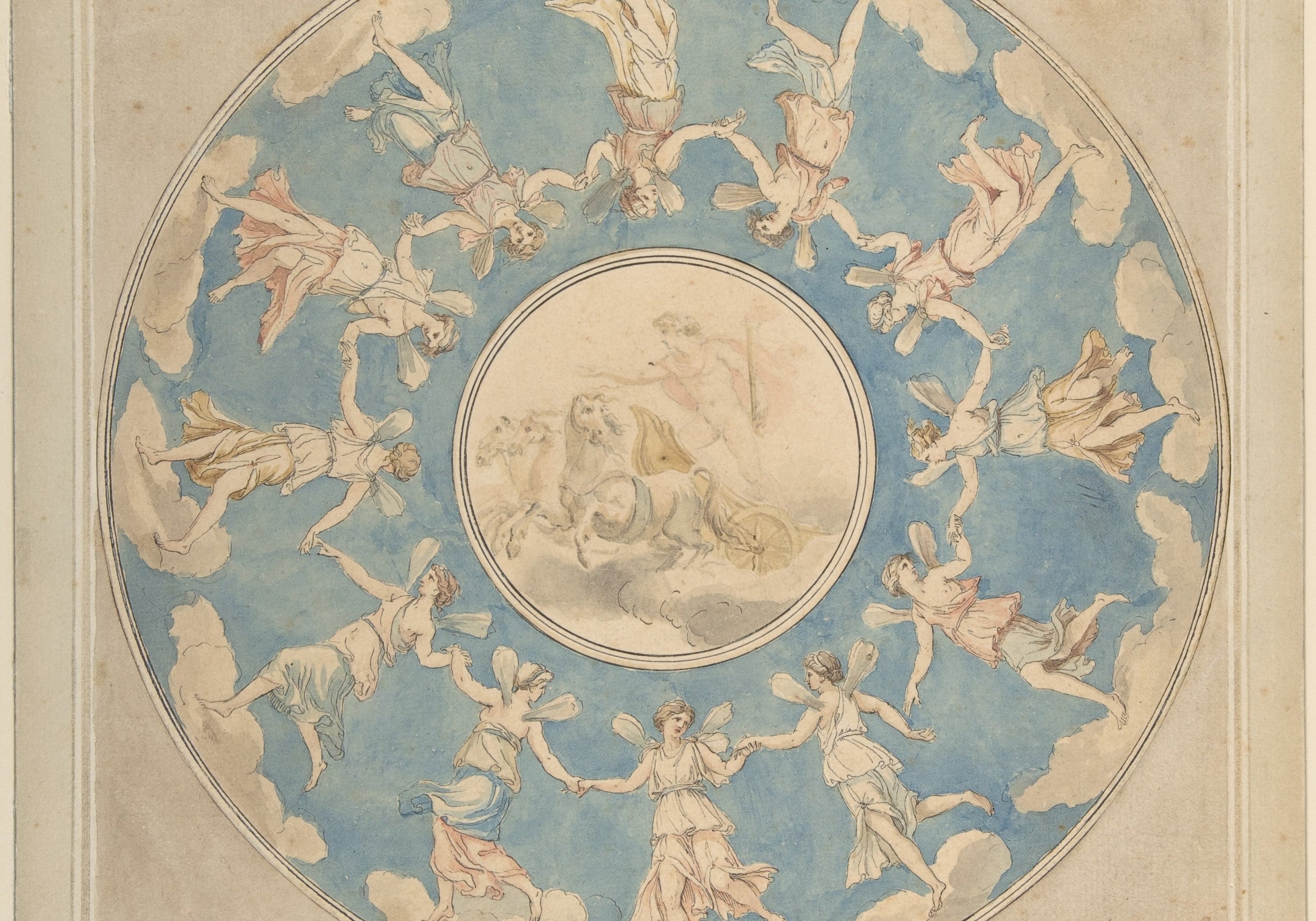Houses Divided

By: Devin Miles...
Since astrology is based on the mathematical system of astronomy, understanding it all requires diligence. A lot of people only go so far as learning their planetary placements and often fail to take more complex pieces of astrology into account. Not only are the placements of planets important, but so are their relationships to the planets around them, as well as the houses they reside in. Harmonious placements mean nothing if they are aspected poorly (have poor angular relationships to other planets) or fall in a house that challenges the values of that placement significantly. Taking the time to explore the more convoluted side of astrology offers new perspectives on your expression of self and understanding of others, which I believe is powerful.
Think of the sky as two big pie charts: the houses make up twelve pieces derived from Earth’s axis and follow the same 24-hour rotation of Earth as planets and celestial bodies move through them. The twelve signs of the zodiac form the other pie chart, staying stationary in the galaxy as Earth and other planets traverse through them. This is where we get birth charts—a birth chart is essentially a snapshot in time of the planets’ placements in each of the twelve houses as well as the twelve signs at the moment you were born.
Houses are indicative of many things in astrology. If you think of the planets as areas of influence, the houses are the different areas of life that are influenced. Each of the twelve houses represents both abstract and tangible concepts such as finances, marriage, temperament, public roles, and a myriad of other things that comprise your experiences in life.
One major thing to consider about houses is their quality of being in the diurnal (daytime) or nocturnal (nighttime) hemispheres.
Nocturnal Houses 1-6 (the bottom half of the chart): they recede into darkness.
Diurnal Houses 7-12 (the top half of the chart): where planets journey during the day.
This is important when considering planetary placements in the houses—does the planet live in the light, where it feels comfortable being seen, or is it hidden in the shadows? This also becomes evident as houses 1-6 explore more personal themes, while the last six focus on more universal concepts. You may also notice that opposing houses (those quite literally across from each other in a chart) seem to have similar overarching themes because of this.
Nocturnal Houses (Personal Themes)
1st House:
This is where the Ascendant lies—the zodiac sign rising on the eastern horizon at any given time. The 1st house is all about the “self” and identity. It gives insight into your temperament, stature, appearance, and the energy you project—your frequency, your "vibe." How do you present yourself? How do you communicate your ideas? The 1st house represents the presence of life and vitality.
2nd House:
I think of this house like the Magician card in tarot, which highlights the efficiency of your arsenal. What assets are at your disposal? The 2nd house signifies material gains and resources. It’s commonly referred to as the Gate of Hades (god of death and wealth), along with its opposite, the 8th house. This gate symbolizes the path to and from the underworld, where you learn hard lessons about resources—how to access, manage, and value them. The 2nd house reflects your relationship with both material and internal wealth.
3rd House:
In this house, you explore your immediate surroundings and relationships with those closest to us. It’s the foundation of skills and strengths, acting as a pillar of guidance. Through the 3rd house, you dive deeper into your thoughts and invite outside perspectives from siblings, neighbors, and our community. It’s where you begin to see how others influence you and how you relate to them.
4th House:
The 4th house is the behind-the-scenes footage of your life, the bloopers that don't make it into the show. It speaks to your foundations, upbringing, and the way you’ve been nurtured. It’s associated with your roots—ancestry, family, teachers, and early influences. Who are you behind closed doors? This house represents your private self, the version of you at home. It’s the lowest point in the sky, in direct contrast to the public visibility of the 10th house.
5th House:
To me, the 5th house has an eerie connection to hedonism. It governs pleasure—sex, creativity, entertainment, and the people or things that bring you joy. After the 4th house establishes the environment that shaped you, the 5th house is about how you shape yourself. What do you delight int? How do you express your creativity and find enjoyment in life?
6th House:
The 6th house, the last on the nocturnal hemisphere, represents the less glamorous parts of life—pain, illness, servitude, and labor. It’s where you confront physical ailments, bad fortune, and the obstacles that challenge personal growth. This house reflects the physical tolls and barriers you face on your journey.
Diurnal Houses (Universal Concepts)
7th House:
This is where the Descendant resides, marking the zodiac sign setting on the western horizon. The 7th house begins the diurnal hemisphere and shifts focus from “self” (1st house) to “the other.” Here, you begin to connect personal experiences to the world around you. It represents partnerships, friendships, and even conflicts. It also touches on themes of decline and loss—specifically the loss of others. This house helps you understand how relationships shape your experiences.
8th House:
The 8th house, opposing the 2nd, is the entrance to the Gate of Hades. It delves into the complexities of resources—losses, debts, shared assets, and the emotional journeys tied to them. This house explores the consequences of mismanaged resources and their impact on others. It’s less about having resources and more about the emotional and relational weight they carry. What are the consequences of not using your resources well, or not being able to get them at all? Are they of any benefit to the people around you?
9th House:
The 9th house is where we broaden our horizons. It’s about big ideas outside of yourself, spirituality, and worldview. How do you perceive humanity and the intentions as a whole? What’s your relationship to religion or philosophy? While the opposing 3rd house is all about staying close to home to clarify your ideas of self, the 9th house is about taking the journey away from home to understand the world at large.
10th House:
An antithesis to the 4th house, the 10th house is your curtain call: the public-facing part of your life. It’s considered the Midheaven—the highest point in the sky—and represents your career, reputation, and societal role. This house shows how your role in society and how you can be in service to others. It also shows how others perceive your contributions and how you navigate being in the public eye. Here, you are fully visible, often setting aside the private aspects of your life that might harm your public image.
11th House:
The 11th house focuses on spaces you occupy—community and belonging. What does your network look like? What kind of communities do you associate with and who is your audience? When you become conscious of where you belong, you bring awareness to your true aspirations, considering how the people around us support—or hinder—our goals. It highlights the interpersonal connections that bring abundance and harmony to your life.
12th House:
Despite being in the diurnal hemisphere, the 12th house carries the darkest energy. Where the 6th house addresses physical ailments and bad fortune, the 12th deals with mental health, hidden desires, and isolation. It’s self-undoing—confronting fears, vices, and anxieties. Here, you come face-to-face with the ideas you have about yourself and the world, questioning your need and capacity for escape. It reveals the weight of your experiences and encourages introspection, often leading to seclusion or feelings of marginalization.
When there is a planetary placement in any of the houses in your birth chart, the influence that planet has begins to affect the house.
For example, if you have Mars placed in your 2nd house, you may find that you have a keen inclination to keep your personal resources in order by way of direct action—networking for community, taking on multiple jobs for financial gain, etc. Both of these placements are also affected by the sign that planet resides in. If that Mars placement in your 2nd house happened to be in Libra (a weaker placement for Mars and a rather passive sign in general), this could inhibit your ability to thrive with direct action and therefore your inclination to garner personal resources.
This isn’t to suggest there are no other ways for a person with a Libra Mars in the 2nd house to get to resources; the concepts of astrology are not bible. It essentially shows you patterns of thinking and behavior that people in similar groups exhibit and have exhibited for centuries, and is therefore a useful guide to make inferences about people that fall into these groups. This person can get resources however they know how, astrology just tells us it could be a little harder for them.
So, that’s that on houses—for now! Sometimes astrology can be a lot to take in, but once you start to recognize the synchronicities for yourself, it feels like a life hack to understanding the people and relationships around you. Recognizing these patterns is just the beginning, though. The real magic lies in how you apply what you’ve learned to navigate your strengths and overcome your challenges.
Whether you're diving into your birth chart or exploring the charts of others, astrology offers a powerful lens for self-discovery and growth. Want to keep learning? Check out Holy Blog for more content on using astrology as a tool for self-awareness and growth—we’re just getting started!
- Tags: astrology
28 comments




1 OR 2+439-439-1=0+0+0+1 -